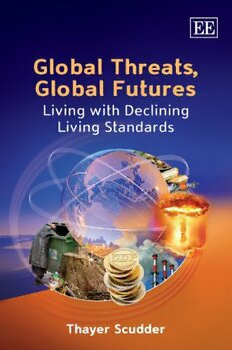
Global Threats, Global Futures PDF
301 Pages·2010·2.49 MB·English
Most books are stored in the elastic cloud where traffic is expensive. For this reason, we have a limit on daily download.
Preview Global Threats, Global Futures
Description:
`Neither Pollyanna nor Prophet of Doom, Professor Scudder has drawn on his 55 years of international experience and presented a clear, hard hitting, extraordinarily well documented analysis of the critical and urgent global challenges that face humankind and of the transformations that will be required to meet those challenges. This is a very important book. It should be read by an informed public, but most particularly by leaders and policy makers of the world's governments, international organizations, educational and religious institutions.' - Lee Talbot, George Mason University, US `This is an extraordinary, bold, and exceptionally well thought out prospectus on the next century of the human condition. Declining living standards, consequential to the pervasive pursuit of growth in terms of Gross Domestic Product, is a central theme that is thoroughly documented and engagingly articulated. The decisive role in the decline of living standards played by global threats including poverty, fundamentalism, environmental degradation, wars, and excess consumption, is compellingly presented from the perspective of the author's unique career.' - Burton Singer, Princeton University, US `This impressive study of the progressive impoverishment of the world's resources speaks with the authority of Thayer Scudder's fifty years of experience with international programs for technological development, especially those that involve river basin development and resulting population displacement and resettlement. Case studies from different continents provide the evidence for the likelihood that the majority in future generations will lead more meager lives than their twentieth century ancestors. He points to what has gone wrong in our approach to the world and its resources and to the measures necessary to offset the damage already caused. If only citizens have the political will to adopt them.' - Elizabeth Colson, University of California, Berkeley, US `This is an important book. It has to be listened to, and for two reasons. The first is the expertise of the author: the guy has been there: this is an anthropologist who is constantly in the field. And he possesses a wide range of skills: part ethnographer, part biologist, as much a humanist as a scientist. The combination of experience and expertise is as powerful as it is unusual. Sadly, a second force in favor of this book is the temper of the times. The giddiness of the last century has been driven underground by the perils of this.' - Robert H. Bates, Harvard University, US Global threats can be expected to cause a global environmental crisis and declining living standards for most people. Threats analyzed include poverty, cultural, economic, political and religious fundamentalism, consumption, population increase and degradation of the global ecosystem. Chapters on the United States, China and Zambia illustrate difficulties that high, middle and low income countries face in addressing such threats. The final chapter examines the type of transformational change required just to reduce the rate and magnitude of future decline.
See more
The list of books you might like
Most books are stored in the elastic cloud where traffic is expensive. For this reason, we have a limit on daily download.
